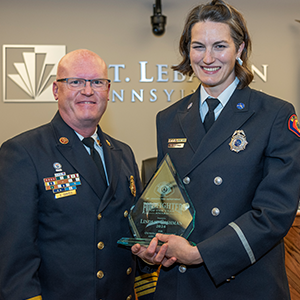town topics
PICKING UP THE LEAVES When it comes to leaf collection, Mt. Lebanon’s Public Works Department runs into a double whammy. Much of the time, it takes a heavy rainfall to bring the leaves down, but if the rain is too heavy, it brings everything down at once and makes it hard to harvest all the leaves.
“Some years, everything comes down in one week, and then it can take us three weeks to catch up,” says Public Works director Tom Kelley.
A big build-up of fallen leaves also can thwart leaf collection efforts—six of the 12 trucks Mt. Lebanon uses are vacuum trucks, which suck up leaves in a fraction of the time the regular trucks take, but they cannot work in excessively wet conditions. When wet leaves stick to the streets, a worker has to pry the leaves from the ground and shovel them onto the leaf loader. An early snowfall can further complicate things, as some trucks used for leaf collection are pressed into service for snowplow duty.
“We can’t do both at the same time,” says Kelley. “We don’t have the staff or the equipment; nobody does.”
At the height of leaf collection season, the crews work 10-hour days, including Saturdays. Kelley, who has fielded more than his share of complaints about tardy collection, has this reply: “Just be patient. We will get to you.”
ROAD DIET Back in 2009, we reported that the Economic Development Council was investigating putting Washington Road on a “road diet” to help make the street more friendly to pedestrians and bicycles. The concept would have reduced the four-lane road to three travel lanes from Shady Drive East to Cochran Road. The center lane would have been a left-turn-only lane, and the fourth lane would have been split to create two smaller bicycle lanes.
EDC volunteers researched engineering studies that showed road diets did not cause traffic to back up significantly. However, PennDOT recently completed its own traffic engineering analysis on the concept as it would apply to Washington Road and concluded that the change would cause traffic to back up through adjacent intersections, causing everyone too much of a delay.
For example, the average commute in the morning and afternoon peak times for drivers is six to nine minutes. Add the proposed changes, and PennDOT says that travel time would increase to an average of 13 to 28 minutes in the morning and 21 to 40 minutes in the afternoon.
That doesn’t mean Mt. Lebanon is done looking for ways to make the street friendlier for bikes and people. The municipality’s comprehensive plan has identifed improvements that can be made to several intersections along Washington Road to increase pedestrian safety. A new bike/pedestrian committee is being formed to work hand-in-hand with Mt. Lebanon’s environmental sustainability board to come up with ways to make alternative transportation easier and safer. Commercial Districts Manager Eric Milliron, an avid cyclist himself, has applied for a grant from Sustainable Pittsburgh to bring back the Tour de Lebo bike ramble, which would be the committee’s first task. The grant, if awarded to Mt. Lebanon, would be used to produce maps and brochures outlining the safest ways to bike to the business districts and parks for the race—and long afterwards.





